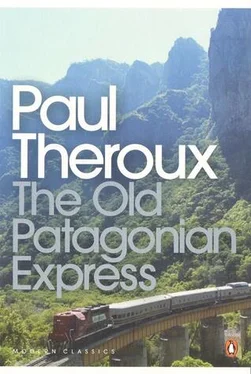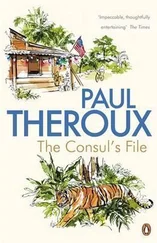Paul Theroux - The Old Patagonian Express - By Train Through the Americas
Здесь есть возможность читать онлайн «Paul Theroux - The Old Patagonian Express - By Train Through the Americas» весь текст электронной книги совершенно бесплатно (целиком полную версию без сокращений). В некоторых случаях можно слушать аудио, скачать через торрент в формате fb2 и присутствует краткое содержание. Год выпуска: 2008, Издательство: Penguin Books Ltd, Жанр: Путешествия и география, на английском языке. Описание произведения, (предисловие) а так же отзывы посетителей доступны на портале библиотеки ЛибКат.
- Название:The Old Patagonian Express: By Train Through the Americas
- Автор:
- Издательство:Penguin Books Ltd
- Жанр:
- Год:2008
- ISBN:нет данных
- Рейтинг книги:5 / 5. Голосов: 1
-
Избранное:Добавить в избранное
- Отзывы:
-
Ваша оценка:
- 100
- 1
- 2
- 3
- 4
- 5
The Old Patagonian Express: By Train Through the Americas: краткое содержание, описание и аннотация
Предлагаем к чтению аннотацию, описание, краткое содержание или предисловие (зависит от того, что написал сам автор книги «The Old Patagonian Express: By Train Through the Americas»). Если вы не нашли необходимую информацию о книге — напишите в комментариях, мы постараемся отыскать её.
The Old Patagonian Express: By Train Through the Americas — читать онлайн бесплатно полную книгу (весь текст) целиком
Ниже представлен текст книги, разбитый по страницам. Система сохранения места последней прочитанной страницы, позволяет с удобством читать онлайн бесплатно книгу «The Old Patagonian Express: By Train Through the Americas», без необходимости каждый раз заново искать на чём Вы остановились. Поставьте закладку, и сможете в любой момент перейти на страницу, на которой закончили чтение.
Интервал:
Закладка:
I said, 'That's a timely thought for Good Friday.'
'I hadn't thought ofthat! Oh, yes!' He laughed so hard he startled two passers-by.
As he fished out his door-key, I asked him about Patagonia.
'I have been there,' he said. 'But I don't know it well. I'll tell you this, though. It's a dreary place. A very dreary place.'
'I was planning to take the train tomorrow.'
'Don't go tomorrow. Come and see me. I like your reading.'
'I suppose I can go to Patagonia next week.'
'It's dreary,' said Borges. He had got the door open, and now he shuffled to the lift and pulled open its metal gates. The gate of the hundred sorrows,' he said, and entered, chuckling.
Borges was tireless. He urged me to visit him again and again. He stayed up late, eager to talk, eager to be read to; and he was good company. By degrees, he turned me into Boswell. Each morning when I woke I sat down and wrote the conversations that had taken place the night before; then I walked around the city, and at nightfall I boarded the Subterranean. Borges said that he seldom went out. 'I don't go to the embassies, I don't go to parties — I hate to stand around and drink.'
I had been warned that he could be severe or bad tempered. But what I saw was close to angelic. There was something of the charlatan in him — he had a way of speechifying, and I knew he was repeating something he had said a hundred times before. He had the beginnings of a stutter, but he calmed that with his hands. He was occasionally magisterial, but he could be the opposite, a kind of student, his face elfin with attentiveness, his fingers locked together. His face became aristocratic in repose, and when he bared his yellow teeth in the exaggerated grin he used to show pleasure — he laughed hard at his own jokes — his face came alight and he looked like a French actor who has realized that he has successfully stolen the show. ('Stolen the show!' Borges would say. 'You can't say that in Spanish. That's why Spanish literature is so dull.') His was the perfect face for a sage, and yet, working his features a certain way, he could look like a clown, but never a fool. He was the gentlest of men; there was no violence in his talk and none in his gestures.
'I don't understand revenge,' he said. 'I have never felt it. And I don't write about it.'
'What about "Emma Zunz"?'
'Yes, that's the only one. But the story was given to me and I don't even think it's very good.'
'So you don't approve of getting even — of taking revenge for something that was done to you?'
'Revenge does not alter what was done to you. Neither does forgiveness. Revenge and forgiveness are irrelevant.'
'What can you do?'
'Forget,' said Borges. 'That is all you can do. When something bad is done to me, I pretend that it happened a long time ago, to someone else.'
'Does that work?'
'More or less.' He showed his yellow teeth. 'Less rather than more.'
Talking about the futility of revenge, he reached and his hands trembled with a new subject, but a related one, the Second World War.
'When I was in Germany just after the war,' he said, 'I never heard a word spoken against Hitler. In Berlin, the Germans said to me' — now he spoke in German — ' "Well, what do you think of our ruins?" The Germans like to be pitied — isn't that horrible? They showed me their ruins. They wanted me to pity them. But why should I indulge them? I said' — he uttered the sentence in German — ' "I have seen London." '
We continued to talk about Europe; the conversation turned to the Scandinavian countries and, inevitably, the Nobel Prize. I did not say the obvious thing, that Borges himself had been mentioned as a possible candidate. But, quite off his own bat, he said, 'If I were offered it, I would rush up and grasp it in two hands. But which American writers have got it?'
'Steinbeck,' I said.
'No. I don't believe that.'
'It's true.'
'I can't believe that Steinbeck got it. And yet Tagore got it, and he was an atrocious writer. He wrote corny poems — moons, gardens. Kitsch poems.'
'Maybe they lose something when they're translated from Bengali into English.'
‘They could only gain by that. But they're corny.' He smiled, and his face became beatific — the more so because of his blindness. It frequently went this way: I could watch him studying a memory. He said, 'Tagore came to Buenos Aires.'
'Was this after he won the Nobel Prize?'
'It must have been. I can't imagine Vittoria Ocampo inviting him unless he had won it.' He cackled at that. 'And we quarrelled. Tagore and I.'
'What did you quarrel about?'
Borges had a mock-pompous voice. He reserved it for certain statements of freezing dismissiveness. Now he threw his head back and said in that voice, 'He uttered heresies about Kipling.'
We had met this evening to read the Kipling story, 'Dayspring Mishandled', but we never got to it. It had grown late, it was nearly dinnertime; we talked about Kipling's stories and then about horror stories ingenerai.
'"They" is a very fine story. I like Lovecraft's horror stories. His plots are very good, but his style is atrocious. I once dedicated a story to him. But it is not as good as "They" — that is very triste.'
'I think Kipling was writing about his own dead children. His daughter died in New York, his son was killed in the war. And he never went back to the States.'
'Well,' said Borges, 'he had that fight with his brother-in-law.'
I said, 'But they laughed him out of court.'
'"Laughed him out of court" — you can't say that in Spanish!' He was gleeful, then he pretended to be morose. 'You can't say anything in Spanish.'
We went out to eat. He asked me what I had been doing in South America. I said that I had given some lectures on American literature, and that twice in describing myself as a feminist to Spanish-speaking audiences I had been taken for a man confessing a kind of deviation. Borges said that I must remember that the Latin Americans were not very subtle on this point. I went on to say that I had spoken about Mark Twain, Faulkner, Poe, and Hemingway.
'What about Hemingway?' he asked.
'He had one great fault,' I said. 'I think it is a serious one. He admired bullies.'
Borges said, 'I could not agree more.'
It was a pleasant meal, and afterwards, walking back to his apartment house- again he whacked the awning posts at the hotel — he said, 'Yes, I think you and I agree on most things, don't we? Eh?'
'Maybe,' I said. 'But one of these days I have to go to Patagonia.'
'We don't say Patagonia,' said Borges. 'We say "Chubut" or "Santa Cruz". We never say Patagonia.'
'W H Hudson said Patagonia.'
'What did he know? Idle Days in Patagonia is not a bad book, but you notice there are no people in it — only birds and flowers. That's the way it is in Patugonia. There are no people there. The trouble with Hudson was that he lied all the time. That book is full of lies. But he believed his lies, and soon he couldn't tell the difference between what was true and what was false.' Borges thought a moment, then said, There is nothing in Patagonia. It's not the Sahara, but it's as close as you can get to it in Argentina. No, there is nothing in Patagonia.'
If so, I thought — if there is really nothing there — then it is the perfect place to end this book.
21 THE 'LAGOS DEL SUR' (LAKES OF THE SOUTH) EXPRESS
Patagonia was also the way home. I had cancelled several train reservations in order to spend more time with Borges, but now I stopped procrastinating and made firm plans to head south. I had a few days in hand before I could leave Buenos Aires but, excluded from the Argentine intimacy of the long Easter holiday, I roamed the city on my own. It now depressed me. Some of the gloom the natives had temporarily dispelled entered my own soul and dampened it. It was partly the effect of La Boca, the Italian district near the harbour; there were boys swimming in the oily, evil-smelling harbour, and I saw more fakery than charm in the Sicilian-style houses and restaurants; some of the squalor was affectation, the rest was real dirt. I went to the Chacarita Cemetery — everyone seemed to be doing that. I found Peron's tomb and saw women kissing his bronze creepy face and twining carnations around the handle on the mausoleum door ('Fanatics!' said a man standing nearby. 'It is like football,' whispered his wife). One night, driving towards a suburb with Rolando, we were overtaken by a policeman on a motorcycle, who waved us to the roadside. Rolando did the talking. The policeman said that we had gone through a red light. Rolando insisted the light had been green. At last, the policeman agreed: the light had been green. 'But it is your word against mine,' said the policeman, in a voice coyly extortionate. 'Do you want to be here all night, or do you want to settle this now?' Rolando gave him about seven dollars' worth of pesos. The policeman saluted and wished us a happy Easter.
Читать дальшеИнтервал:
Закладка:
Похожие книги на «The Old Patagonian Express: By Train Through the Americas»
Представляем Вашему вниманию похожие книги на «The Old Patagonian Express: By Train Through the Americas» списком для выбора. Мы отобрали схожую по названию и смыслу литературу в надежде предоставить читателям больше вариантов отыскать новые, интересные, ещё непрочитанные произведения.
Обсуждение, отзывы о книге «The Old Patagonian Express: By Train Through the Americas» и просто собственные мнения читателей. Оставьте ваши комментарии, напишите, что Вы думаете о произведении, его смысле или главных героях. Укажите что конкретно понравилось, а что нет, и почему Вы так считаете.












